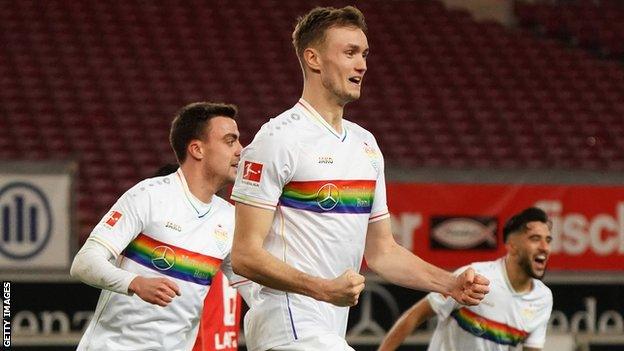LGBT+ History Month: Thomas Hitzlsperger says football has made 'progress' since he came out
- Published
Thomas Hitzlsperger: The past seven years have been a fantastic journey
Thomas Hitzlsperger says becoming chief executive of Stuttgart shows football has made "progress" on LGBT+ issues since he came out seven years ago.
The former Aston Villa and Germany midfielder, 38, revealed he is gay in January 2014, a few months after retiring because of injury problems.
He was appointed chief executive of Bundesliga club Stuttgart, where he had also been a player, in February 2019.
"The past seven years have been a fantastic journey," he told BBC Sport.
"The fact I'm the CEO of one of the biggest clubs in Germany is a sign of the progress. It wouldn't have been possible 10 years ago - even five years ago.
"My life changed seven years ago when I went public, and has changed for the better."
Speaking to BBC Radio 5 Live's Euro Leagues podcast, Hitzlsperger said he understood the "anxiety" any current professional footballer still has about coming out.
"Someone insulted me on social media recently using homophobic language, but it just doesn't touch me any more. I'm confident enough that it doesn't even reach me," he added.
"But for those people who are not publicly out, who have not told their friends and families, to them it's really hurtful, it pains them."
Hitzlsperger said he is encouraged by working with fan groups and the German Football Association to raise awareness of LGBT+ issues, but football needs "courageous people" to confront homophobic language in the stands.
"In football stadiums there are a lot of people who disagree with discrimination, but then it takes someone to stand up to the person next to them and say: 'We don't accept this,'" said Hitzlsperger.
"I sense fans are more welcoming, but we can't eradicate homophobia and we need courageous people to stand up and tell these people."

Stuttgart wore a special rainbow-striped kit against Mainz last month
Stuttgart wore a special rainbow-striped shirt this season and Hitzlsperger said such symbols and rainbow flags do help society discuss LGBT+ issues, but they can only go so far.
World Cup 2022 hosts Qatar, where homosexuality is illegal, have said fans of all sexualities are welcome and that rainbow flags will be permitted in stadiums., external
"Rainbow flags don't change the human rights situation in Qatar," said Hitzlsperger.
"[World governing body] Fifa does have an impact, so what they do is use those symbols and we get good pictures on TV. But within Qatar - I've not been there myself - I don't think it's somewhere the LGBT community are looking forward to going."
World Cup 2022 chief executive Nasser Al-Khater has said Qatar "understands the difference in people's cultures" and that "everybody will be welcome and everybody will be treated with respect".
Hitzlsperger said marking LGBT+ History Month is "very important" because it helps people who may question why it is necessary to understand "a bit better how people who are closeted feel".
He added: "It helps them understand why people don't come out, what it takes for them and why they need support."
Hitzlsperger said he has not had any professional footballers ask him for advice on coming out, but he does provide guidance to amateur players, alongside the German FA.
The former West Ham and Everton player added he has "no regrets" about not coming out while still playing.
"I took the time I needed and I was then prepared. You have to be stable to do it and that's why I have no regrets," he said.
"The public statement wasn't a relief - the relief was the first time I told my brother, my best mate, my parents.
"I wasn't ready before. I didn't have the support network and I had too many people telling me don't do it. But when I retired, no-one could hold me back."

The Monday Night Club: How has Pep turned things round and can Micah get Timo Werner firing?
Hip Hop that shook America: How Kanye West challenged ideas about rap and religion
